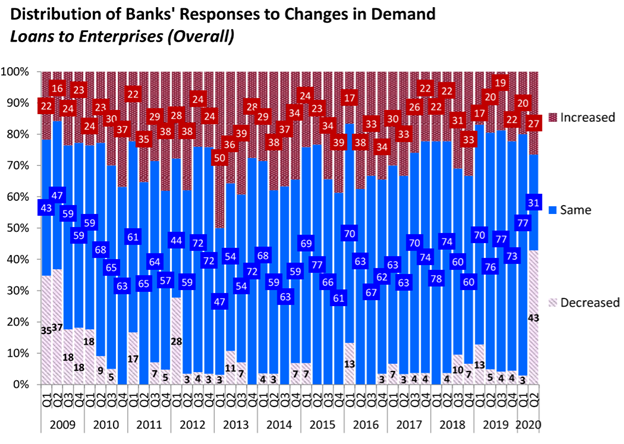MONDAY MACRO: Banks have now tightened credit standards but Aggregate CCFP signals that this is no reason to panic

Banks have always played an important role in the economy, and their significance is highlighted even more during a financial crisis.
The loans they provide to both individuals and companies can spell the difference between growth or bankruptcy.
This quarterly survey helps us monitor banks’ lending behavior as well as loan demands. Understanding what drives their actions will help paint a better picture of the state of the Philippine economy.
Philippine Markets Daily:
The Monday Macro Report
Powered by Valens Research
Last week, we showed that the Philippines’ capacity utilization has reached a new low in Q2 2020. We’ve also mentioned that GDP growth for the same period sharply contracted by 16.5%, the lowest since 1981.
Consumption level at this time declined due to the increase in unemployment rate and lowered productivity. As expected, both metrics showed worse numbers in Q2 than in the previous quarter.
In an attempt to soften the blow of the pandemic on the economy, the Bangko Sentral ng Pilipinas (BSP) had slashed interest rates thrice this year. In total, rates are now 175 basis points lower than last year.
In a normal environment, lower interest rates can fuel the economy. In times of economic turmoil such as today’s, a low interest rate environment can lengthen business survivability in the near term. Businesses would be able to borrow at lower rates to keep their operations going.
However, low rates do not mean an increase in actual loans. Banks will still need to assess each borrower’s capability to pay back their debt. Banks also have other requirements to fulfill, such as being compliant with the capital adequacy ratio. The more risk-weighted assets the bank has, the lower its CAR, and the less likely the bank would be able to absorb any losses and remain solvent.
Moreover, lower rates would negatively impact banks’ profitability due to lower interest to be collected from these loans.
Naturally, if banks are not keen on lending, or perhaps are loosening their lending standards, it makes access to cash harder to reach to the hands of borrowers.
In the Q2 2020 Senior Bank Loan Officers’ Survey (SLOS), this looks to be the case. Despite the BSP’s multiple attempts to increase the money supply of the economy, banks are not increasing their lending activities.
The SLOS is one way to understand banks’ current sentiments and their potential actions. As we mentioned in our March 3rd Monday Macro article, this survey enhances our understanding of banks’ lending behavior. The information from this survey is also used by the BSP to monitor the effectiveness of their monetary policy actions.
The chart below shows banks’ response to the SLOS with regard to changes in demand for loans to enterprises as of Q2 2020.

The red bars above indicate that 27% of respondent banks “somewhat increased” their lending of loans to enterprises from the previous quarter.
The blue bars in the middle indicate that 32% of banks decided to maintain their credit standards for the quarter.
Finally, the striped bars show that 43% of banks decreased their lending of loans to enterprises either “somewhat” or “considerably.”
The majority of the banks that have maintained their credit standards for multiple consecutive quarters are now decreasing their lending exposure to enterprises. Moreover, 69% of the survey respondents tightened their credit standards.
The banks cited the following reasons for the overall net tightening found in the BSP survey: uncertain economic outlook, expected deterioration in borrowers’ profiles, worsening of industry- or firm-specific outlook, and banks’ lower tolerance for risk.
Tighter credit standards have historically been a very early signal of a recession. It normally signals that a recession will occur in two to four years because tighter credit standards can subdue growth potential.
This is why constant monitoring of banks’ behavior through this survey is essential for investors. Credit plays a huge role in businesses, who will need to refinance their obligations if earnings become inadequate to cover their payments.
However, businesses might not be able to borrow if credit standards remain tight.
If credit standards remain tight or become even tighter in the following quarters, the economy might take a much longer time to recover because of the limited capital available to businesses.
Hopefully, banks’ credit standards will ease in the next quarter as economic activity picks up, and earnings generation becomes more stable. This will likely be driven by the ability of businesses to be flexible in this uncertain environment.
In the meantime, our August 10 Monday Macro Report on the Philippines’ Aggregate CCFP shows that financial obligations are still comfortable enough for firms to continue their operations without defaulting on their loans in the near-term.
As businesses continue to slowly open, on top of the BSP’s monetary policy actions, the Philippines still has the potential to make a swifter recovery than in credit-driven recessions.
About the Philippine Market Daily
“The Monday Macro Report”
When just about anyone can post just about anything online, it gets increasingly difficult for an individual investor to sift through the plethora of information available.
Investors need a tool that will help them cut through any biased or misleading information and dive straight into reliable and useful data.
Every Monday, we publish an interesting chart on the Philippine economy and stock market. We highlight data that investors would normally look at, but through the lens of Uniform Accounting, a powerful tool that gets investors closer to understanding the economic reality of firms.
Understanding what kind of market we are in, what leading indicators we should be looking at, and what market expectations are, will make investing a less monumental task than finding a needle in a haystack.
Hope you’ve found this week’s macro chart interesting and insightful.
Stay tuned for next week’s Monday Macro report!
Regards,
Angelica Lim
Research Director
Philippine Markets Daily
Powered by Valens Research
www.valens-research.com




